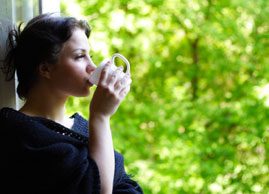Relaxation drinks: Can you sip your stress away?
Relaxation drinks claim to be the antidote to energy beverages’ingredients that include natural supplements are supposed to help you feel calmer. But do they really work?

Source: Web exclusive, April 2010
If you’ve always wanted to try acupuncture to unwind but have a thing about needles, now’s your chance. A Quebec-based product called Slow Cow promises ‘an acupuncture session’ in a can, drawing on the soothing benefits of chamomile and other natural ingredients and delivering them as a low-calorie beverage‘no needles required.
Slow Cow is one of dozens of new beverages to hit the marketplace that are referred to as ‘relaxation drinks’ or ‘anti-energy’ drinks, and it was one of the first available in Canada. You’ll spot others available globally’all with chill-out names such as RelaxZen, Koma Unwind, Carpe Diem and ViB (Vacation in a Bottle)’that promise to serve as a tonic to our hectic lives.
Slow Cow specifically promises to help ‘in the improvement of concentration, memory and learning capacity without causing sleepiness.’ According to Keith Whitlock, the company’s director of communications, customers are drawn to the beverage for these benefits, and because it’s made from purified water plus natural ingredients. In fact, Slow Cow combines eight key ingredients, many of which have traditionally been used to promote sleep or relaxation, including chamomile and passiflora (passion flower) to treat insomnia, the herb valerian as well as linden and hops to reduce nervousness, and L-theanine (an amino acid found in tea) for relaxation, to sharpen your focus, and to promote learning and memory. (Slow Cow also contains sucralose, a zero-calorie artificial sweetener, natural and artificial flavours, sodium, potassium and some preservatives).
Other common ingredients found in relaxation drinks include melatonin and kava. Melatonin is a hormone produced by the brain that regulates our sleep-wake cycle. You can buy a synthetic form at most drug stores to beat jetlag or as a natural alternative to sleep medications, although whether it’s an effective sleep aid is still controversial. Kava is an herb native to the islands of the South Pacific that has been traditionally used to promote sleep and fight fatigue. Nowadays, it’s promoted as a natural health product for anxiety, insomnia and the symptoms of PMS, but products containing kava are banned in Canada because the herb can cause serious liver damage.
So will Slow Cow, and for that matter other relaxation beverages, help deliver the laid-back vibe they promise? At $2.79 to $2.99 per 250-mL can, it’s definitely more expensive than a warm bath but will save you a bundle compared to the cost of a good masseuse. Heather Boon, PhD and associate professor at the Leslie Dan Faculty of Pharmacy at the University of Toronto, says she’s skeptical. ‘The labels I’ve seen from these products don’t tell me how much of the active ingredients are in them…. So the first thing I’m worried about is whether there is enough of any of these ingredients to do anything.’ In fact, while Slow Clow doesn’t list how much L-theanine or valerian it contains on the can, those figures are available on its the website: 25 milligrams (mg) of L-theanine and 75 mg of valerian, for example, doses which Boon says are a bit low to have therapeutic effects.
She also says there is very little research into the effects of these particular natural health products, which makes it difficult to say whether or not they’ll truly help you feel zen. ‘If you just look at the scientific evidence for valerian or chamomile, for example, there are really no good clinical trials to back up these claims,’ she says. But Boon, who is an expert in complementary and alternative medicine, also cautions that the lack of scientific studies to cite, doesn’t mean these ingredients don’t work. Rather, it just means there’s no scientific evidence at this point.
‘I don’t see this as any different from making yourself a cup of chamomile tea,’ she says. ‘There’s no scientific evidence that that works [as a relaxation aid] either, the way people usually make it. But I know lots of people who enjoy a cup of tea and feel great afterward. We just shouldn’t be arguing that it’s just like a drug because it’s not.’
Related:
‘ 5 flu-fighting foods
‘ Foods that heal: Can nutraceuticals cure common illnesses?
‘ 5 reasons to eat more antioxidants
Don’t miss out! Sign up for our free weekly newsletters and get nutritious recipes, healthy weight-loss tips, easy ways to stay in shape and all the health news you need, delivered straight to your inbox.




